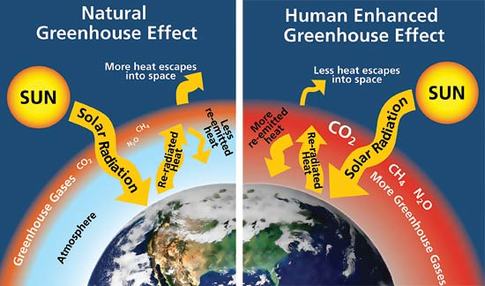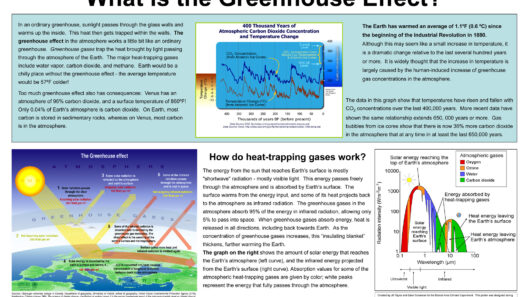In the intricate tapestry of Earth’s ecosystems, the greenhouse effect manifests as a dual-edged sword. This natural phenomenon serves as both protector and adversary in the context of climatic stability and life sustainability. The greenhouse effect curates warmth, allowing life to flourish, yet it also harbors potential pitfalls that can lead to dire environmental ramifications. The crux of the matter lies in discerning whether the greenhouse effect should be regarded as a boon or bane.
To embark on this exploration, we first need to unravel the intricate mechanics of the greenhouse effect itself, examining its foundational role in planetary habitability.
The Science Behind the Greenhouse Effect: Nature’s Insulative Blanket
The greenhouse effect operates as nature’s insulative blanket, a delicate balance that retains solar warmth in the Earth’s atmosphere. When sunlight penetrates the atmosphere, the Earth absorbs this energy and subsequently re-radiates it as infrared radiation. Greenhouse gases, such as carbon dioxide, methane, and nitrous oxide, act as a thermal barrier, trapping some of this heat. Without this phenomenon, our planet would resemble a cold, barren wasteland.
The symbiotic relationship facilitated by the greenhouse effect supports agriculture, mediates water cycles, and sustains habitats. This balance is essential for fostering diverse ecosystems and providing the requisite conditions for countless species. The allure of the greenhouse effect is palpable, seemingly offering a felicity that begets a flourishing world.
However, this balance is precarious, under siege from our industrial pursuits. Modern human activity has induced an unprecedented spike in greenhouse gas concentrations, tipping the scales towards an enhanced greenhouse effect that jeopardizes the very existence we cherish.
Pros of the Greenhouse Effect: A Genuine Benefit or Just a Mirage?
The benefits of the greenhouse effect are readily apparent, akin to a vital organ sustaining life. Herein lies a closer examination of its advantages:
Fostering Life on Earth
By maintaining an average global temperature conducive to life, the greenhouse effect is indispensable for the growth of flora and fauna. Agricultural practices, from staple crops to diverse botanicals, rely heavily on this phenomenon to thrive. A temperate climate fosters productivity, feeding billions of inhabitants and acting as a cornerstone for global food security.
Significant Role in Climate Regulation
Moreover, the greenhouse effect plays a pivotal role in regulating climate systems. As it captures heat, it helps to mitigate extreme weather fluctuations. A stable climate arguably enables the development of complex societies, trade routes, and cultural exchanges. The stability provided by the greenhouse effect is often the bedrock upon which civilizations build their legacies.
Contributing to Technological Progress
Interestingly, the challenges brought forth by climate change, amplified by the enhanced greenhouse effect, have spurred remarkable technological innovations. Renewable energy pursuits, sustainable agriculture, and environmental conservation efforts exemplify how humanity adapts its ingenuity in response to challenges. Technology has become our ally in navigating the delicate balance between leveraging the greenhouse effect and combating its excessive ramifications.
Yet, despite these compelling advantages, the dark shadows cast by the enhanced greenhouse effect loom large, warranting a thoughtful look at the counterpart of this ecological dichotomy.
Cons of the Greenhouse Effect: Unmasking the Perils
The other facet of the greenhouse effect reveals a troubling narrative, one of escalating dilemmas:
Climate Change: A Looming Catastrophe
The ramifications of an intensified greenhouse effect are foremost among these concerns: climate change. As greenhouse gas emissions soar, global temperatures spiral out of control, resulting in unfathomable impacts on natural environments. Sea levels rise, storms intensify, and ecosystems face irreparable damage. Imagine a world where climate refugees become the norm, as entire communities seek refuge from the vanished lands they once inhabited.
Biodiversity: A Fractured Mosaic
The unrelenting rise in temperature and erratic weather patterns jeopardize biodiversity, leading to habitat loss and species extinction. Each species plays a unique role in its ecosystem, contributing to a delicate balance that sustains life. The loss of even the most obscure organisms triggers a cascading effect, unraveling intricate webs of life and diminishing the planet’s resilience.
Social and Economic Disparities
The burden of climate change does not rest evenly; the consequences disproportionately affect the most vulnerable populations. Economically disadvantaged communities, often with limited resources, face exacerbated difficulties in adapting to climatic tumult. This disparity not only perpetuates cycles of poverty but also engenders social unrest. As climate-related issues such as food scarcity and water shortages escalate, the societal fabric threatens to fray.
Striking a Balance: Navigating a Sustainable Future
In weighing the pros and cons of the greenhouse effect, it becomes evident that this natural phenomenon is not unequivocally beneficial or detrimental. The challenge lies in achieving equilibrium. Transitioning to a low-carbon economy, implementing stringent emissions regulations, and fostering sustainable practices are crucial steps toward mitigating the adverse impacts of the enhanced greenhouse effect.
It is imperative to view the greenhouse effect not merely as a binary issue but as part of a larger ecological narrative. With determination and cooperation, humanity can harness its understanding of the greenhouse effect to cultivate a harmonious relationship with our planet, ensuring a sustainable and thriving future for generations to come.
Ultimately, the question of whether the greenhouse effect is good or bad invites deeper reflection. It is a testament to the intricate relationship between humanity and nature—a relationship fraught with challenges, yet brimming with the potential for renewal. In this ongoing story, the role of the greenhouse effect is both cautionary and inspiring, imploring us to act with intent and wisdom.







